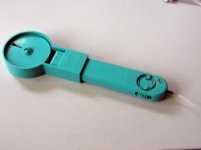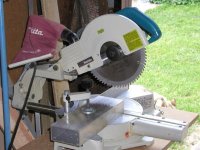I wanted to start a thread where anybody could say something about favourite and useful tools they use as well as some helpful methods for doing things easier and saving time and money. I think it might be beneficial for all.
I know that I might not be breaking any new ground here, but probably not everybody is familiar with that tool, and I use it always when soldering. I can't imagine working without it and it is especially helpful when I need both hands and can hold that thing with my mouth. It is called Solder Dispenser and I got mine from http://www.percyaudio.com/ for $10.
It is called Solder Dispenser and I got mine from http://www.percyaudio.com/ for $10.
I know that I might not be breaking any new ground here, but probably not everybody is familiar with that tool, and I use it always when soldering. I can't imagine working without it and it is especially helpful when I need both hands and can hold that thing with my mouth.
Attachments
I have been considering getting something like this
<a href="http://www.garrettwade.com/jump.jsp?lGen=detail&itemID=105318&itemType=PRODUCT&iMainCat=10055&iSubCat=10059&iProductID=105318"><img src="http://www.garrettwade.com/images//product/family/91G0105.jpg" ></a>
unfortunately the versions I have seen locally don't look that well made.
Might be useful when things are to big for a drill press , or if you don't have room for the drill press.
, or if you don't have room for the drill press.
James
<a href="http://www.garrettwade.com/jump.jsp?lGen=detail&itemID=105318&itemType=PRODUCT&iMainCat=10055&iSubCat=10059&iProductID=105318"><img src="http://www.garrettwade.com/images//product/family/91G0105.jpg" ></a>
unfortunately the versions I have seen locally don't look that well made.
Might be useful when things are to big for a drill press
James
I'm using Cardas solder because I got it really cheap. In less critical applications I'm using 2% silver. I never did listening comparisons as to the sound of differend type of solder. Check the following link: http://www.diyaudio.com/forums/showthread.php?s=&postid=34970#post34970 (page 2). The guy who calls himself Scorpion and everybody thought was a rookie explained the sound of different types of solder better than anybody else on that forum.
What I also like to use when soldering is a no clean rosin flux. Sometimes when soldering big wires or binding posts the joint doesn't always look nice and shiny. I'm using small brush and wett that joint with liquid rosin flux and then heat it again. It always look perfect after that.
What I also like to use when soldering is a no clean rosin flux. Sometimes when soldering big wires or binding posts the joint doesn't always look nice and shiny. I'm using small brush and wett that joint with liquid rosin flux and then heat it again. It always look perfect after that.
Re: Steel Wool
NEVER USE STEEL WOOL!!!
soldering iron tips are usually plated. (i think weller tips are iron plated copper) It you use steel wool to clean the tip, you will eventually remove the iron, leaving the copper exposed. the copper will oxide and the tip will be ruined.
using a wet sponge on a hot iron is the better way to clean the tip.
fcel said:What about what kind of material do you guys use to wipe off the sometime dirty solder from the tip of the soldering iron?
NEVER USE STEEL WOOL!!!
soldering iron tips are usually plated. (i think weller tips are iron plated copper) It you use steel wool to clean the tip, you will eventually remove the iron, leaving the copper exposed. the copper will oxide and the tip will be ruined.
using a wet sponge on a hot iron is the better way to clean the tip.
I use a tip cleaner/tinner. It's a small cup of something I dip the tip in. I think the stuff is made of tin and acid, but I'm not shure. Then I clean the tip in a wet sponge. Allways use demineralised water.
Anyone using Kester 2% silver solder (62% tin 36% lead 2% silver) ?
Anyone using Kester 2% silver solder (62% tin 36% lead 2% silver) ?
I guess I do things the most half-assed around here... I wipe my soldering iron on a rag. Wroks well enough for me, sometimes I even wet it so I don't constantly burn it, but only someitmes.
As for what tools are the most usefull I'd have to say that a drill press makes building a chasis a whole lot faster and easier, I just got one myself, and now I don't know how I got along without it.
Unless of course you meant for speaker building, then a router or radial arm saw would be more usefull (or should I say indespensable).
As for what tools are the most usefull I'd have to say that a drill press makes building a chasis a whole lot faster and easier, I just got one myself, and now I don't know how I got along without it.
Unless of course you meant for speaker building, then a router or radial arm saw would be more usefull (or should I say indespensable).
I must agree that if you are really serious about your chassis drill press is something you really need. Not only for drilling holes, but for countersinking and tapping (when you can afford Tapmatic )
)
Next tool to get is a band saw. Both of those items are relatively cheap and you can expect to pay as low as $100 for either one.
And when you are into speakers a router is a must.
Next tool to get is a band saw. Both of those items are relatively cheap and you can expect to pay as low as $100 for either one.
And when you are into speakers a router is a must.
flux ?
Guys,
When I am soldering I use a small artist paint brush to put a little bit of flux (looks like vaseline) onto each component's wire first. Now after the soldering and trimming of the wire I see a little biy of melted flux overflow to the next track on the PCB. Do I have to remove those extra flux? If it is best to clean them please tell me what can I use and how? What effects it will have amp with it on the PCB if I left them other than does not look good?
Thanks in advance,
Chris
Guys,
When I am soldering I use a small artist paint brush to put a little bit of flux (looks like vaseline) onto each component's wire first. Now after the soldering and trimming of the wire I see a little biy of melted flux overflow to the next track on the PCB. Do I have to remove those extra flux? If it is best to clean them please tell me what can I use and how? What effects it will have amp with it on the PCB if I left them other than does not look good?
Thanks in advance,
Chris
Skip the flux thing!
Normal soldering metal has flux inside and in sufficient amount. Flux is only needed when you solder large metal pieces.
Just give the time for the soldering iron to warm up so the flux can do good. Also not too hot iron. 300-350 deg C is normal. Don't use too cold either because the soldering process will take longer and the joint won't get better.
Some flux is corrosive and must be removed but you have to read on the label for the flux.
Normal soldering metal has flux inside and in sufficient amount. Flux is only needed when you solder large metal pieces.
Just give the time for the soldering iron to warm up so the flux can do good. Also not too hot iron. 300-350 deg C is normal. Don't use too cold either because the soldering process will take longer and the joint won't get better.
Some flux is corrosive and must be removed but you have to read on the label for the flux.
shopping time!
I always clean the excess flux remaining on my boards, using pure acetone found localy in farmacies. The one that is used from my girlfriend to remove her nail paint! Its the best and quickest I have ever used! Though, u have to ask for pure acetone as sometimes they sell also some acetone containing oil which is not desirable at all.
I am cleaning the tip using !!!moist kitchen paper!!!
I use to soldering irons 1. Antex 25W and 2. Ersa 35W
For solder I used to use Billiton 60/40 for a long time, but eventually I tried Multicore Sn62 (tin62/lead36/silver2) for about 18euros/500gr, and I am alot more satisfied from the quality and the looks of the solder on the pcb(alot more shinny and solid).
As for drilling, if u are into chasis construction a drill press is a mast. I found out that after a long time though, when I went to buy a press (small one) for my bosch electric drill and costed 55euros while a complete (including motor) press only costed 60euros! I bought the complete press (from Praktiker) and I am happy ever after...
I also use a bosch 12v drill and small cheap "rooter" to 30.000rpm for grinding.
Regards
Panos
I always clean the excess flux remaining on my boards, using pure acetone found localy in farmacies. The one that is used from my girlfriend to remove her nail paint! Its the best and quickest I have ever used! Though, u have to ask for pure acetone as sometimes they sell also some acetone containing oil which is not desirable at all.
I am cleaning the tip using !!!moist kitchen paper!!!
I use to soldering irons 1. Antex 25W and 2. Ersa 35W
For solder I used to use Billiton 60/40 for a long time, but eventually I tried Multicore Sn62 (tin62/lead36/silver2) for about 18euros/500gr, and I am alot more satisfied from the quality and the looks of the solder on the pcb(alot more shinny and solid).
As for drilling, if u are into chasis construction a drill press is a mast. I found out that after a long time though, when I went to buy a press (small one) for my bosch electric drill and costed 55euros while a complete (including motor) press only costed 60euros! I bought the complete press (from Praktiker) and I am happy ever after...
I also use a bosch 12v drill and small cheap "rooter" to 30.000rpm for grinding.
Regards
Panos
fcel said:Band saw is for cutting metal sheets?
While I like to use band saw for sheet metal, anything over 1/4" is pretty hard to cut. In that case I'm using 10" compound mitre saw with non-ferrous metals blade. For me that's the best way to cut anything up to 8" wide and 4" thick. I even cut large heat sinks in that manner. Your piece must be properly clamped though.
Attachments
- Status
- This old topic is closed. If you want to reopen this topic, contact a moderator using the "Report Post" button.
- Home
- Design & Build
- Equipment & Tools
- Useful tools and techniques

